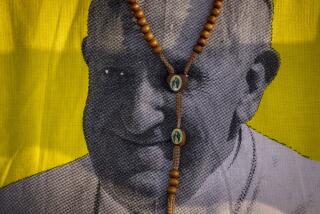Evangelicals Reflect Divergent Attitudes
- Share via
MANILA — The 4,000 evangelical Christians taking part in a 10-day congress on world evangelization reflected deep divisions in their final communique on how to relate to the World Council of Churches and the Roman Catholic Church.
The Manila Manifesto, a lengthy summary statement issued before the closing Thursday of the gathering of people from 170 countries, said, “Evangelical attitudes to the Roman Catholic and Orthodox churches differ widely. Some evangelicals are praying, talking, studying Scripture and working with these churches. Others are strongly opposed to any form of dialogue or cooperation with them.”
With regard to the World Council of Churches, the final text of the Manila statement said, “Some of us are members of churches which belong to the World Council of Churches and believe that a positive yet critical participation in its work is our Christian duty. Others among us have no link with the World Council. All of us urge the World Council of Churches to adopt a consistent biblical understanding of evangelism.”
A special-interest group at the Lausanne II meeting here tackled the issue of future relations with the World Council, particularly in response to a statement issued by evangelicals who took part in a San Antonio meeting held in May by the World Council’s Commission on World Mission and Evangelism.
But on the last day of the congress, the Rev. Saphir Atyal of India, who chaired the group, announced there would be no formal communication to the World Council of Churches because the council had not sent any official communication to the Manila meeting.
The Rev. Eugene Stockwell, one of three World Council observers at the meeting, said he heard “a great variety of opinions” about the international ecumenical body at the Lausanne II congress. Citing one part of the Manila Manifesto, Stockwell said, “The problem tends to be when one person or group says theirs is the biblical understanding of evangelism.”
Many participants in Lausanne II, particularly Anglicans and charismatics, have worked with Catholics in the area of evangelism. But for others, notably Latin Americans, relations with the Catholic Church sometimes are strained.
More to Read
Sign up for Essential California
The most important California stories and recommendations in your inbox every morning.
You may occasionally receive promotional content from the Los Angeles Times.













